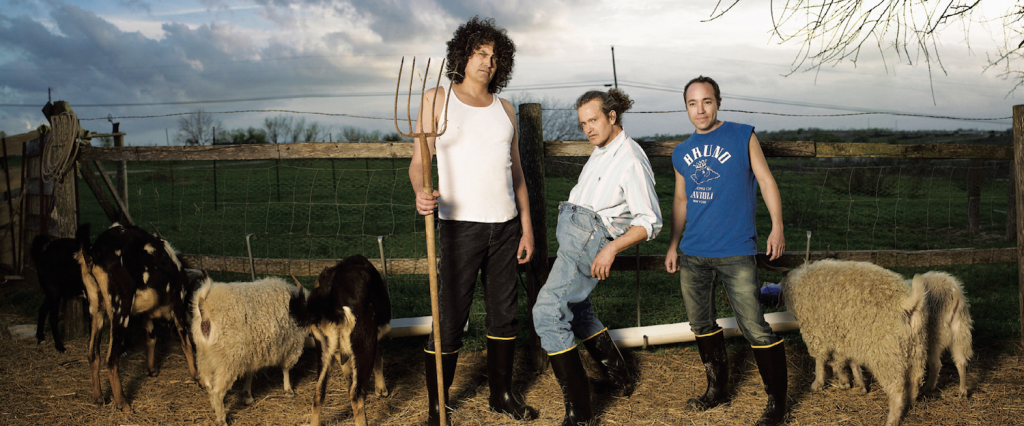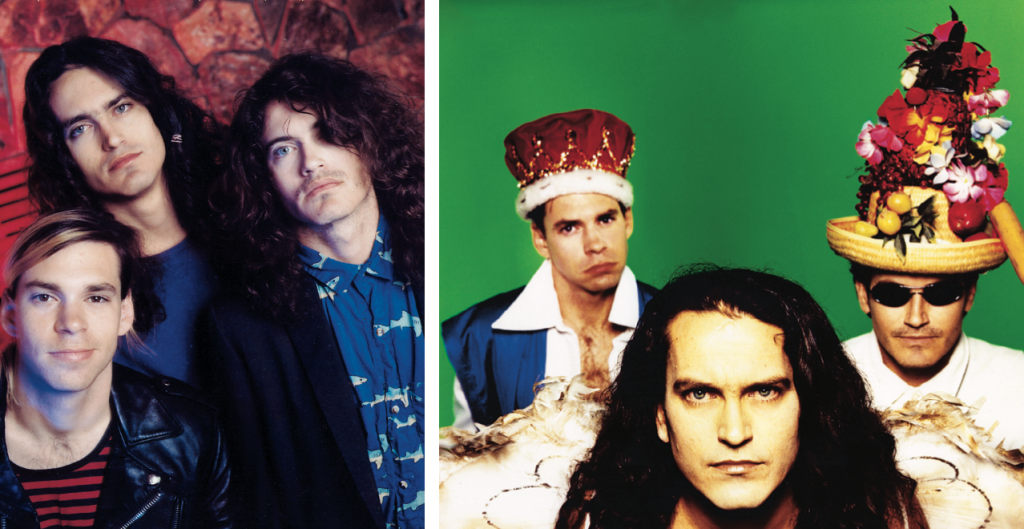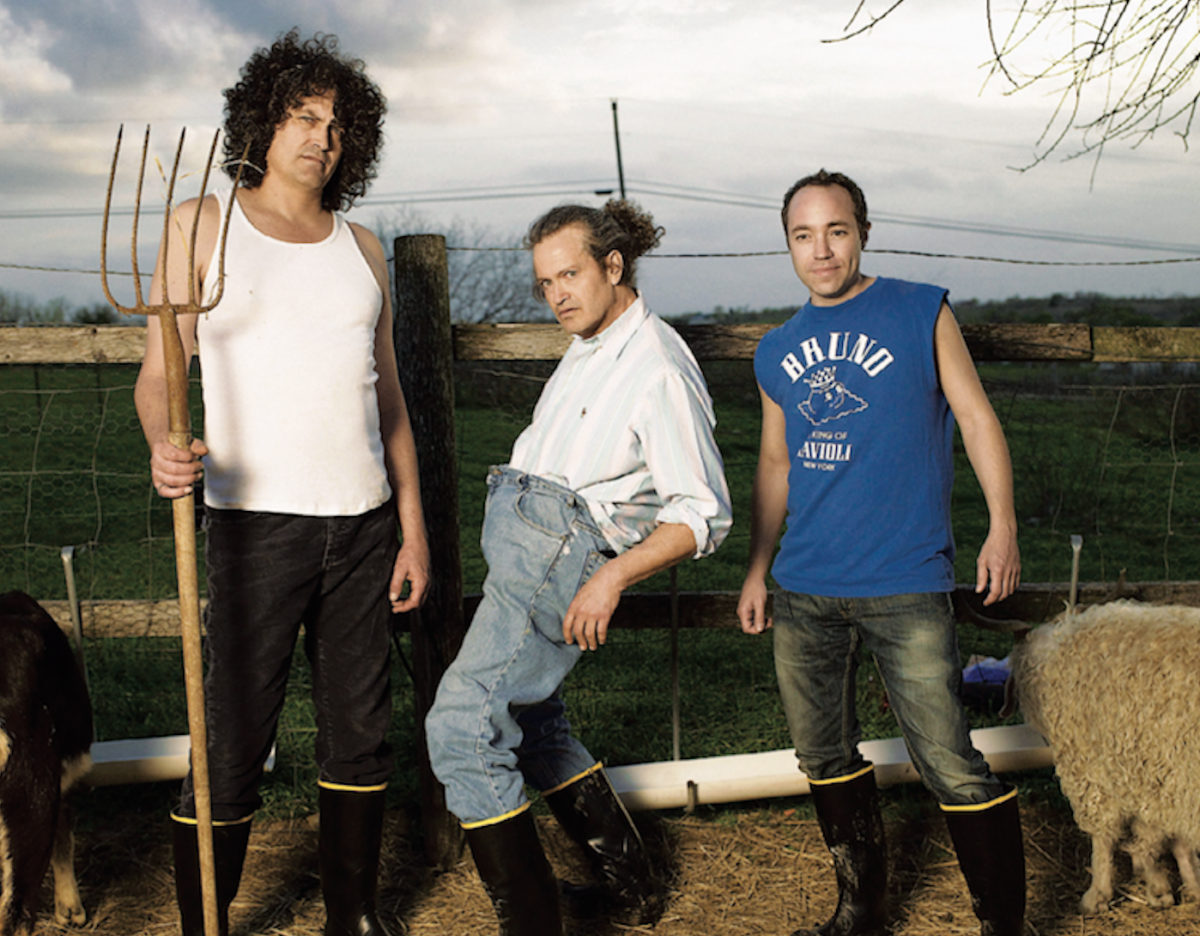
There’s brotherly love, and then there comes a point when you have to let go. Curt Kirkwood hit the second part of that equation sometime in 2004. His younger brother Cris, a heroin and crack addict who’d gone off the rails after the 1998 overdose death of his wife, Michelle Tardif, seemed determined to kill himself.
“Curt tried to help me, but I was beyond help,” says Cris. “Once Michelle passed away, that broke me completely. That kind of tragedy, something so unnecessary and so irrevocable and irreparable, broke me emotionally, spiritually and, ultimately, physically.”
Cris and Curt Kirkwood formed the core of the Meat Puppets, the freakiest punk-rock band ever to crawl out of the Arizona desert. The group spent the ’80s exploring the outer limits of American hardcore—adding plenty of country and psychedelic touches—and achieved minor fame in the ’90s thanks to Nirvana’s patronage. As with Kurt Cobain and Co., heroin would destroy the Meat Puppets. Last year, however, the band reunited to record Rise To Your Knees (Anodyne), the Kirkwoods’ first album together since 1995. Between the drug addiction and the brothers’ bitter memories, it’s an unlikely revival to say the least.
“I stopped being fucked up is the bottom line,” says Cris sheepishly. “I finally got to the point where Curt would be willing to deal with me.”
1980-1992
The Meat Puppets story begins in the late ’70s in the Sunnyslope neighborhood of Phoenix, where the Kirkwoods are raised by their mother. The grandsons of Carl Renstrom, a millionaire businessman, the Kirkwoods attend Brophy Prep, a local private school. The brothers befriend neighborhood drummer Derrick Bostrom and form Bastions Of Immaturity, which turms into the Meat Puppets in 1980. Curt plays guitar and Cris handles bass, and one of the keys to the group’s sound is their brotherly vocal harmonies. The Meat Puppets’ first record, the In A Car EP, is a rough-edged, crash-and-bash affair that attracts the attention of Black Flag guitarist Greg Ginn, whose SST Records releases the Puppets’ self-titled debut album. The trio quickly hits its stride with sophomore effort Meat Puppets II.
“There was a lot of unpopular decision-making coming up to that record,” says Curt. “That’s the first time I pulled out a whole bunch of really mellow, weird tunes. There’s a handful of punk rock on there, but there’s also an equal amount of poignant balladry. The other guys didn’t really want to do it because they were afraid the punk rockers would turn on us, which is what I wanted.”
A string of critically adored, weak-selling SST albums follows, some (Up On The Sun) better than others (Monsters). Throughout the ’80s, the band’s sound morphs from punk thrash to a more varied hybrid that incorporates elements of country, blues and rock.
Like SST labelmates Hüsker Dü, Sonic Youth and Dinosaur Jr, the Pups eventually sign with a major label. London Records releases Forbidden Places, an album produced by Dwight Yoakam collaborator Pete Anderson. “That was our entrance into this weird major-label thing,” says Curt. “They tricked us. They hired us and said we could produce our own stuff. When we got there, they were like, ‘Ha, ha.’”

1993-1996
Although the Pups always find favor with the critics, they gain a wider audience in 1993 thanks to Nirvana, which begins covering Meat Puppets II track “Lake Of Fire” and asks the band to open its In Utero tour. An MTV Unplugged appearance, during which the Kirkwoods join Nirvana onstage to cover three songs from II (“Lake Of Fire,” Plateau” and “Oh, Me”), is the commercial highlight of the Puppets’ career.
The band’s new album, Too High To Die, begins to sell thanks to the Pups’ first hit single, “Backwater.” In a bid to capitalize on the Unplugged exposure, a re-recorded version of “Lake Of Fire” appears as a hidden track on Too High To Die, which is eventually certified a gold record. Tours with Soul Asylum, Blind Melon and Stone Temple Pilots ensue, and the experiences on the road with fellow addicts in the latter two bands don’t bode well for the Meat Puppets.
“It was Hollywood Babylon at its finest worst,” Curt told the Phoenix New Times about a 1994 stadium tour supporting STP. “The refuse of that tour is still floating around, in the form of Scott Weiland and my bro.”
While the drugs are plentiful, the fame is fleeting. The Kirkwoods’ final record together, No Joke!, is less inspired, and when London is made aware of Cris’ drug problem, the label withdraws financial support for a national tour. The Pups part ways in 1996. Soon afterward, Bostrom forms Today’s Sounds, a short-lived solo project that issues an EP featuring covers of novelty hits such as “Pac-Man Fever.”
1997-2005
Curt moves to Austin, Texas, and forms a Puppets-like ensemble called the Royal Neanderthal Orchestra. The band eventually reassumes the Meat Puppets moniker, but after two releases, Curt again retires the name and begins playing in Eyes Adrift with Nirvana bassist Krist Novoselic and Sublime drummer Bud Gaugh in 2002. Three years later, Curt releases solo album Snow.
Tardif’s overdose sends Cris into a downward spiral. Upon discovering her body in the bedroom of their Tempe home, Cris—who has felony drug warrants out for his arrest—calls the band’s manager and flees the scene. He spends the next few years in and out of rehab. Cris hits rock bottom on Dec. 26, 2003, when he strikes a security guard in the head with a baton at a Phoenix post office after getting into an argument with a woman over a parking space. The guard draws his gun and shoots Cris in the back. On probation for an earlier drug offense, Cris is sentenced to 24 months in prison.
“That’s gutter-crawling shit,” says Curt. “That’s why I abandoned him.”
While incarcerated, Cris gets sober, loses weight (at the height of his addictions, he ballooned to more than 300 pounds; he currently weighs 180) and has some dental work done (his drug use had caused him to lose all his teeth). Curt—through son Elmo, who still lives in Arizona—learns of Cris’ recovery. A phone call begins the process of repairing the brothers’ relationship.
“The only reason he’s back is because he isn’t a fucking piece of shit anymore,” says Curt with his usual forcefulness. Few musicians can emphatically spew like Curt Kirkwood. Equal parts acid and banter, it’s one of the characteristics that defines him as an ace frontman. “I’ve never hung around with junkies ’cause I’ve been in this business too long. There are a lot of real turds in this business, and they’re not all music executives.”
“I’ve been locked up plenty of times before,” says Cris. “But it was long enough this time that I was actually able to come to terms somewhat with myself and my addictions. When I got out, I didn’t go back to hurting myself. Then Curt called; since then, it’s been like trying to figure out how to go about being somebody who actually does this again.”
2006-2007
The Meat Puppets’ rebirth comes after Curt spends most of 2006 touring in support of Snow. “I felt it was my prerogative to do another Meat Puppets record, maybe even my responsibility, because it’s always been one of the least grasping things that I do in this whorish business,” says Curt. “People relatively kiss my ass when it’s the Meat Puppets. And they can just kiss my ass because it’s my old band, and that’s what the band has always been: punk rock.”
The Rise To Your Knees sessions begin with the question of who’s going to do the drumming. Bostrom, who works at Whole Foods in Phoenix and was never a big fan of life on the road, declines to participate. After a stint with Primus drummer Tim Alexander, the Kirkwoods stumble upon an unexpected solution. Ted Marcus enters the picture while working as a sound man on a documentary about the Puppet. A drummer since age eight, Marcus becomes the band’s new rhythm machine.
While occasionally bitter and caustic (the album’s opening line is “You can run, but you’ll never get away from the smell of the garbage”), Rise To Your Knees is the most lyrically thoughtful record the Pups have ever done. Laced with shafts of Curt’s guitar feedback, songs such as the title cut, “Vultures” and “Enemy Love Song” (“I want to be a rainbow laid out across a stormy sky”) are damned near peaceful, a condition opposite of the Puppets’ usual state of mind and art.
“After Snow, I realized people really like the singing and don’t care about all the energy,” says Curt. “Oh sure, they dig it if you jump around and act like a retard. We were always high strung and wanted to stomp the shit out of places in our own way. Not like metal, but more frightening like psychoses. It comes from a pathetic hatred of our audience. Once we have their money, we’re like, ‘All right, get the fuck out. That’s more punk rock for you. You’re not supposed to like me, fucker.’”
For Cris, Rise To Your Knees is all about just being alive and being a Meat Puppet again. “Somewhere, there was always this shimmer of, ‘Gee, I wish I could have it again,’” he says. “I don’t know if I can ever have it again, because I was a pretty light spirit and definitely darkened my soul. But just to have my brother back in my life is totally special. And actually getting to play again is totally fucking trippy.”
—Robert Baird







